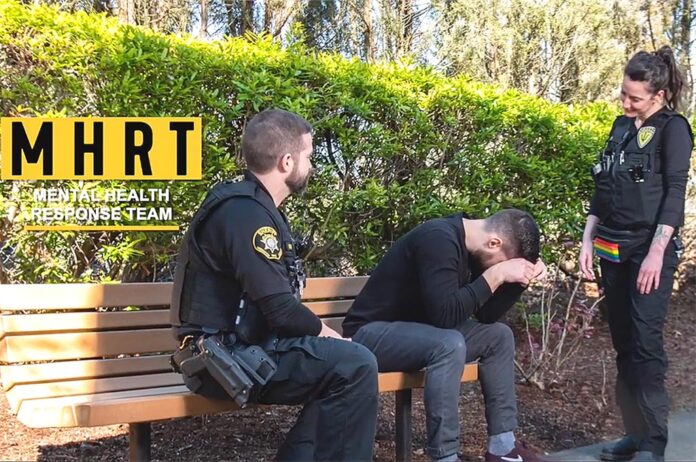Tigard, Tualatin and Sherwood police departments will bolster their response to people in mental health crisis in the coming year after the three cities agreed to help fund an expansion of Washington County’s Mental Health Response Team.
Each of the three cities will be pitching in to help fund an additional mental health clinician, who will partner with local police officers as they respond to calls for service involving persons in a mental health crisis. The new team is formally a part of Washington County’s existing Mental Health Response Team (MHRT), which is comprised of two Washington County Sheriff’s Deputies and two mental health clinicians who are assigned to the entire county. The new team, by contrast, will primarily respond to calls in those jurisdictions, but could respond outside the area in cases where other assets were not available.
The move is being welcomed with open arms by local police, said Tualatin Police Chief Bill Steele, who was involved in helping the County originally establish its MHRT a decade ago when he still worked for the Sheriff’s Office.
“We have to make sure it’s available to our residents at the south end of the county,” he said. “Time can be of the essence, and if we have to reach out, they could be coming from Hillsboro or somewhere out there. To meet that growing need we have to make sure that resource is available.”
Steele added that in his 25-year law enforcement career, the number of calls for service involving persons in a mental health crisis or a related issue have increased sharply in recent years.
“It’s something our officers deal with on a daily basis,” he said. “And in years past that wasn’t always the case.”
County officials say they are excited about the expansion of the MHRT, which was created in 2011.
“We’ve always wanted to grow the team,” said Kristin Burke, the Special Projects Supervisor for Washington County Health and Human Services. “When you only have two teams in a county as big as ours, that can get challenging at times. There’s always been a desire to turn it into an interagency model.”
The MHRT team is part of a broader county system of mental health care that also includes the Hawthorne Walk-In Center in Hillsboro, and a mobile crisis team that sends mental health clinicians to people in need 24 hours a day. For its part, the MHRT pairs sheriff’s deputies or police officers with master’s level mental health clinicians from Lifeworks NW, a nonprofit group that provides mental health and addiction services from offices across the Portland metro area.
It’s a different model than Crisis Assistance Helping Out On The Streets, or CAHOOTS, which has operated in Eugene for over 25 years. The latter employs mental health experts responding to calls for assistance on their own, whereas the MHRT pairs a mental health clinician with a police officer to ensure the safety of the clinician in cases where a call for service might prove dangerous to an unarmed responder.
Al Roque, Chief Deputy for the Washington County Sheriff’s Office, said the MHRT team is modeled after a program in San Diego. He emphasized that the pairing of police with a clinician gives responders a sense of security while also allowing an immediate response on the medical side, with an ability to follow up afterward with appropriate care where needed.
“That’s the key component,” said Roque. “The team is really good at understanding where the line is between the medical side and the law enforcement side. There’s a hard line in terms of access to information, knowledge and ability to share information, so those things flow together really well.”
Steele agreed and said the mixture will help take some pressure off police officers who are expected to occasionally handle issues that are outside their area of expertise.
“I think our officers have done a great job dealing with what they can, but there are times where they might not be the best fit,” he said. “As a society we’ve defaulted to when you have a need for anything you call the police and they are expected to solve the issue. But sometimes they’re not the best answer. They want to help people, but you can’t be an expert in everything.”
Kris Puttler-Miller, a program director at Lifeworks NW, said the details of how each local agency will assign personnel to the new response teams are still being worked out. She noted that a similar expansion is being carried out in Hillsboro and Beaverton, as well.
“I think we’re still in the coordination phase with those agencies in terms of how exactly it’s going to work,” she said.




















